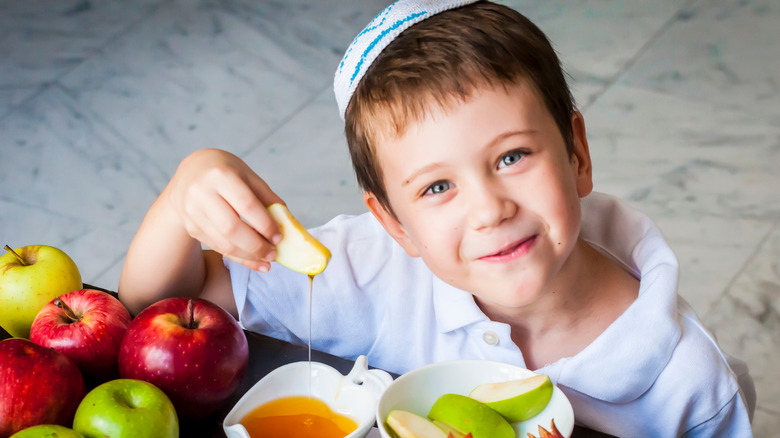The Real Reason We Eat Apples And Honey During Rosh Hashanah
Rosh Hashanah — which some might know as the Jewish New Year — is one of the "High Holy Days" days on the Jewish calendar. Beginning on the first day of the seventh month of the Hebrew calendar, which usually falls sometime between September and October, Rosh Hashanah commemorates the time when God is believed to have created the world. In 2021, it's from September 6-8.
Rosh Hashanah also marks the beginning of the Days of Awe, which culminates on Yom Kippur, the other Jewish "High Holy Day." These ten Days of Awe are meant to be a period of introspection and repentance in anticipation of God's judgement, so the time is generally spent in prayer, contemplation, and reflection, according to History. So unlike the secular New Year, with its carousing, drinking, and loud parties, Rosh Hashanah is a more subdued holiday, when people take the time to reflect on their deeds in the past year and even make amends with others. To celebrate Rosh Hashanah, people of the Jewish faith gather together to attend synagogue, sing, pray, and, of course, share a meal.
Apples and honey are eaten for a sweet new year
While there is certainly feasting on Rosh Hashanah, the food that is eaten has an important significance. "Talking about and eating these foods is a way of engaging and communicating with God," Rabbi Mendel Teldon of Chabad of Mid-Suffolk in New York explained to Dispatch, adding that through food, "we become part of the conversation instead of sitting on the sidelines."
One of the most common ways to start the occasion is with apples and honey. Traditionally, people begin the Rosh Hashanah meal by dipping apple slices into honey and saying a special blessing. These two foods are symbolic, representing the hope for a sweet new year. Other sweet treats may also be enjoyed for the same reason. Many other symbolic foods comprise the Rosh Hashanah meal, like carrots stewed in honey to help bring additional goodness to the new year, pomegranate seeds to represent an abundance of good deeds, and a round, rather than braided, loaf of challah, which symbolizes the circle of life.

